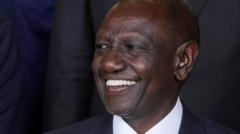Kenya's President William Ruto has become a multifaceted figure in the nation's political landscape, earning a series of nicknames that reflect both public adoration and criticism.
Kenya's President William Ruto: A Name for Every Occassion

Kenya's President William Ruto: A Name for Every Occassion
Exploring the myriad nicknames of a controversial Kenyan leader.
Ruto's evolving persona is encapsulated through an array of nicknames including 'Deputy Jesus,' 'El Chapo,' 'Hustler,' and 'Chicken Seller,' each revealing different dimensions of his public image. From his days as a "hustler" to his controversial rise to presidency, Ruto has embraced a range of identities that show how he is perceived by Kenyans.
At a recent rally in Nairobi, Ruto humorously acknowledged the parade of labels, noting that Kenyans continue to add to the list. "You have given me so many names... Will you stop at ten, or should I prepare for more?" he joked, eliciting laughter from the crowd. Ruto's positive nicknames such as “Hustler,” which mirrors his journey from humble beginnings to power, helped solidify his appeal among the masses, particularly during his climb to the presidency in 2022.
However, his presidency has also drawn harsh scrutiny, with monikers taking on a more derogatory tone. The nickname 'Zakayo,' likened to a Biblical tax collector, suggests the disappointment among citizens over rising taxes and perceived unfulfilled promises. Critics have voiced their anger at tax increases and the perception of government inefficiency, leading to protests that echo the chant "Ruto must go," which has now become synonymous with his leadership.
Ruto’s lightheartedness about his nicknames contrasts with the serious underlying sentiments they reflect. Government spokesperson Isaac Mwaura dismissed concerns about these labels, arguing they are natural and indicative of how the public views their leader. The rise of satire, including cartoons and digital art mocking Ruto, highlights growing discontent and a possible sign of intolerance from officials in response to dissent.
Despite the criticisms, some scholars argue the popularity of these nicknames serves as an emotional outlet for the frustrations faced by younger Kenyans in a challenging economy. As social media amplifies these narratives, many feel Ruto's nicknames resonate with their plight, illustrating the multifaceted roles he plays amidst varying public expectations.
In a landscape cluttered with expressions of sympathy, disapproval, and nostalgia, Ruto stands out as a unique figure in contemporary Kenyan politics, illustrating the power of nomenclature in shaping a leader's legacy.
At a recent rally in Nairobi, Ruto humorously acknowledged the parade of labels, noting that Kenyans continue to add to the list. "You have given me so many names... Will you stop at ten, or should I prepare for more?" he joked, eliciting laughter from the crowd. Ruto's positive nicknames such as “Hustler,” which mirrors his journey from humble beginnings to power, helped solidify his appeal among the masses, particularly during his climb to the presidency in 2022.
However, his presidency has also drawn harsh scrutiny, with monikers taking on a more derogatory tone. The nickname 'Zakayo,' likened to a Biblical tax collector, suggests the disappointment among citizens over rising taxes and perceived unfulfilled promises. Critics have voiced their anger at tax increases and the perception of government inefficiency, leading to protests that echo the chant "Ruto must go," which has now become synonymous with his leadership.
Ruto’s lightheartedness about his nicknames contrasts with the serious underlying sentiments they reflect. Government spokesperson Isaac Mwaura dismissed concerns about these labels, arguing they are natural and indicative of how the public views their leader. The rise of satire, including cartoons and digital art mocking Ruto, highlights growing discontent and a possible sign of intolerance from officials in response to dissent.
Despite the criticisms, some scholars argue the popularity of these nicknames serves as an emotional outlet for the frustrations faced by younger Kenyans in a challenging economy. As social media amplifies these narratives, many feel Ruto's nicknames resonate with their plight, illustrating the multifaceted roles he plays amidst varying public expectations.
In a landscape cluttered with expressions of sympathy, disapproval, and nostalgia, Ruto stands out as a unique figure in contemporary Kenyan politics, illustrating the power of nomenclature in shaping a leader's legacy.



















